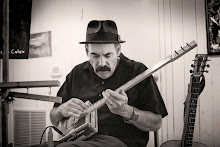My solo acoustic guitar piece, "No More School", from "The Tree People" album was included in a wonderful collection of solo acoustic guitar music from the 1960's and 1970's released by the Numero Group of Chicago this year. I am very happy to be included, and I would like this album, which has some beautiful solo guitar pieces by some very good players, even if my piece from the Tree People album wasn't on it. One of the other guitarists on the album, Richard Crandell, who has recently released some very special albums playing mbira (thumb piano) on the Tzadik label, was in Eugene (and still is in Eugene) at the same time we were- we knew Richard and we did a show with Richard Crandell and Bill Bartels in a park in Eugene in the the 1980's- you can see a poster from that show in a previous post on this blog, "The Story of Human Voices, the second Tree People album". But back to the Numero Group album- it contains extensive liner notes on the history of what they call "primitive solo acoustic guitar" along with notes on each artist. If you like solo acoustic guitar, or better yet if you like music, I would recommend "Wayfaring Strangers- Guitar Soli". Here is what the Numero Group had to say about my piece in their extensive liner notes:
Label: Numero Group
Released: January 8, 2008
Stephen Cohen
No More School
“I always have played with my bare hands, and never have used a pick.”
The Newport Folk Festival converted endless hordes to the religion of folk music, and not the least among them was Stephen Cohen, who has spent a lifetime writing songs and living thoughtfully. A native Rhode Islander, he had better access than most to the annual festival, and he drank in every ounce of bent Americana that George Wein and Albert Grossman thought fit for the program.
The acoustic guitar had become the rank and file’s instrument, unrivalled at the time to play and compose with. And although Cohen had basic music training for the trombone, his approach to guitar was idiosyncratic from the beginning, though he sought no formal education for it. His natural inclination was fingerstyle, and because there was no one to lead him in any other direction, he went.
On Cohen’s 1979 debut The Tree People, he played a Gibson B25, acquired as a young man and strapped to his back as he rambled about the country for the lion’s share of the 1970s. The guitar featured one crucial alteration: its factory-standard metal bridge had been expertly replaced with a permanent wooden one. After settling in Eugene, Oregon, Cohen formed an acoustic ensemble also known as The Tree People that focused on instrumental composition and improvisation. They borrowed heavily from the concepts of both American Primitives and British Traditionalists on their two self-produced albums, but “No More School” is clearly an ode to the former, a flurry of fingers and thumb picking and strumming all over the drop D tuning. Issued in a one-time pressing of 1000 copies, the album pierced more than a few ears, allowing the group to become something of a go-to opener for Fahey and Pentangle whenever they rambled through Oregon.
(a note on the notes: we opened for the John Renborn Group, which had many of the original Pentangle members, not the Pentangle in the 1980's in Eugene. Jeff remembers John Renborn exclaming, in a heavy English accent "Tree People!" as we came off the stage after our set.
Label: Numero Group
Released: January 8, 2008
Stephen Cohen
No More School
“I always have played with my bare hands, and never have used a pick.”
The Newport Folk Festival converted endless hordes to the religion of folk music, and not the least among them was Stephen Cohen, who has spent a lifetime writing songs and living thoughtfully. A native Rhode Islander, he had better access than most to the annual festival, and he drank in every ounce of bent Americana that George Wein and Albert Grossman thought fit for the program.
The acoustic guitar had become the rank and file’s instrument, unrivalled at the time to play and compose with. And although Cohen had basic music training for the trombone, his approach to guitar was idiosyncratic from the beginning, though he sought no formal education for it. His natural inclination was fingerstyle, and because there was no one to lead him in any other direction, he went.
On Cohen’s 1979 debut The Tree People, he played a Gibson B25, acquired as a young man and strapped to his back as he rambled about the country for the lion’s share of the 1970s. The guitar featured one crucial alteration: its factory-standard metal bridge had been expertly replaced with a permanent wooden one. After settling in Eugene, Oregon, Cohen formed an acoustic ensemble also known as The Tree People that focused on instrumental composition and improvisation. They borrowed heavily from the concepts of both American Primitives and British Traditionalists on their two self-produced albums, but “No More School” is clearly an ode to the former, a flurry of fingers and thumb picking and strumming all over the drop D tuning. Issued in a one-time pressing of 1000 copies, the album pierced more than a few ears, allowing the group to become something of a go-to opener for Fahey and Pentangle whenever they rambled through Oregon.
(a note on the notes: we opened for the John Renborn Group, which had many of the original Pentangle members, not the Pentangle in the 1980's in Eugene. Jeff remembers John Renborn exclaming, in a heavy English accent "Tree People!" as we came off the stage after our set.
